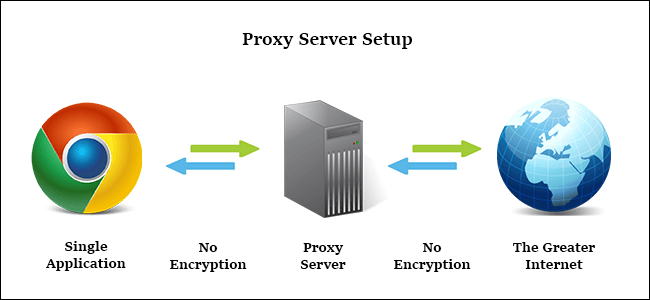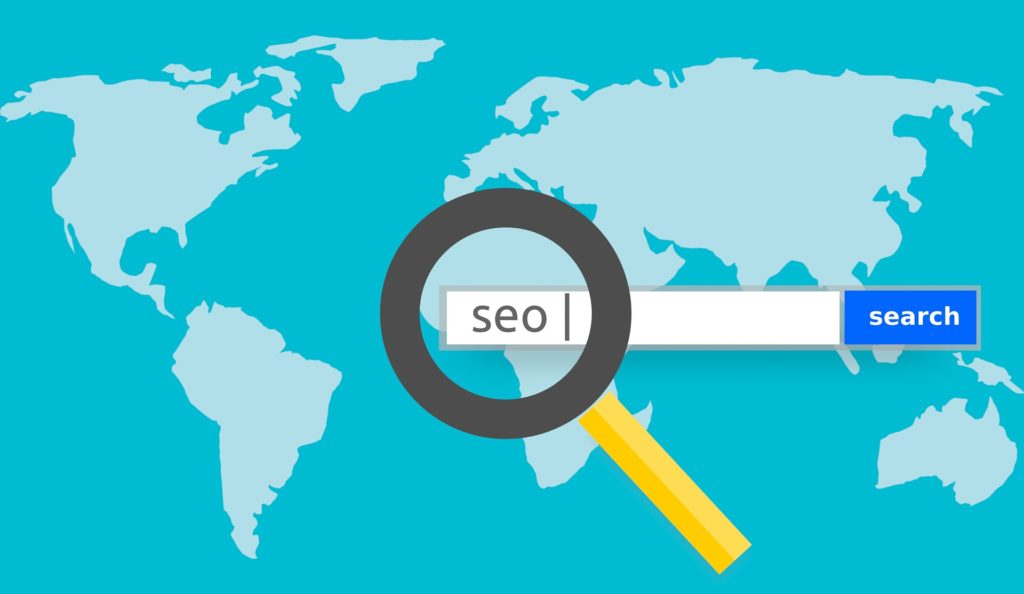If you’re here, we’re guessing that you already have an idea about what a proxy server is. Let’s still break it down for you.
A proxy is an intermediary between your computer and a web resource. That means, when you use a proxy, your computer sends out a request to a proxy server. It is then processed, after which it arrives at the set web address.
Let’s say your web browser is set to use a proxy server and you want to visit sslprivateproxy.com. When you enter the web link, your internet sends out a request to the proxy server and it sends a request to the server where our website is hosted. Our server processes your request and returns the homepage of our website to your proxy server which, in turn, returns it to you.

So what we get is the information about your proxy server and the real you stays hidden.
In short, it provides you with anonymity and may also help you bypass IP address blocking.
Now that you know the basics, you should also know that there are different types of proxies. But in this article, we’re going to have a detailed discussion on shared proxy IPs.
Before we begin, let’s talk a little about private proxies to understand the nuances of shared proxies better.
Private Proxies
As the name suggests, the private proxies are solely dedicated to one user and not accessible to anyone else. That’s why people also call them dedicated IPs.
When you browse the internet, you give away a lot of information about yourself. The companies can find out where you live, your email address, phone number and more such data. Later, they use it to spam your emails or overrun with sale calls.
Using secured private proxies will ensure that your identity stays hidden and that no one steals your information. Apart from providing security and privacy, you also get a much faster and reliable network.
Shared Proxies
Shared proxies’ purpose is the same as private proxies’ — hiding their users IP address and (possibly) preventing hackers or companies from stealing their information.
But the main difference between shared proxies and private proxies is that while in a private proxy you are the sole user, a shared proxy involves a group of users. That means it is just not yours; you share it with many other people.
What’s more, most of the time you wouldn’t even know how many users are actually sharing your IP. As all proxy servers have a limited speed, it means that it can directly affect the speed and the performance of your network. This is because employing shared proxies automatically means sharing speed with other users.
So you must be thinking, then why should we choose a shared proxy over a private one?
There are many benefits of using shared proxies. But before we get there, we have something else to show you.
According to a report from research firm GlobalWebIndex, half a million people globally now hide their IP address. Surprised? Don’t be.
As many as 297 million people worldwide are using software to browse the internet in anonymity.
The chart below shows the top 10 markets for VPNs (and to a further extent, we can extrapolate it as the top 10 markets for proxies):

Well, you can only expect it to increase in the future.
Advantages of Using Shared Proxies Instead of Dedicated IPs
Economical
There are various reasons for the increased popularity of shared proxies and one of them is its reduced cost.
As we all know, there are multiple users browsing in the same shared proxy. Automatically, the cost of a server gets divided amongst the users and an individual can easily afford to buy shared proxies.
Its reduced cost also makes it a better alternative to free proxies which have a high risk of security and privacy breaches.
More Available IP Addresses
There could be many reasons why you’d need more than one IP address on your server. One of the advantages of using a shared proxy is that there are more available IP addresses at lower rates.
This also allows you to select the best geographical location for your website and you can appear from anywhere you want to.
Despite the above-mentioned benefits, some of you might still have second thoughts about safety. Let’s assure you that contrary to what people believe, shared proxies are safe to use.
Users may share the same proxy, but this doesn’t compromise the safety of your data and connection.The only risk involved here is that due to other users, websites or other servers may block or flag your IP address but otherwise, there’s nothing to worry about the security of your data transmitted over shared proxies.
A shared proxy may have its own flaws but it is still economical and useful.
Signs That Say You Need Shared Proxies
Even though shared proxies perform the same duties as the private proxies, there are some projects which would actually require shared proxies.
Web Scraping
Web scraping, also known as web data extraction, is a method of collecting information from across the internet. Adding proxies to your crawling software can prove to be effective, and especially if it’s a shared proxy. How?
There are many companies which have software that can detect if there is a dubious number of requests arriving from the same IP address. If you have a few thousand pages of content from a large target website, then you’re more likely to get caught and they will restrict your movement.
That’s when a shared proxy can be useful. You can easily set proxy into your web scraper and spread out a huge number of requests evenly across different IPs located around the world.
Not only that, the target website will never know that a scraper has accessed their domains. With the help of shared proxies, you use different IP addresses for all your requests, and the target websites will not be able to consider your requests as scrapping.
Search Engine Optimization
The more visitors you have, the more you earn. That’s true. And, through search engine optimization (SEO), we can increase the viewers or visitors to our website.
But why do we need a shared proxy for SEO? You may want to hide or change your IP address for various reasons.
To name a few, you can spy on your competitor’s website without getting caught. Or an SEO specialist would know that to improve your Google rank, one needs to create backlinks. But if you create all your links from the same IP address or domain, Google can mark your business as spam and not allow links posting towards your website.

If you want to protect your SEO efforts, you should consider relying on a shared proxy.
Why You Shouldn’t Use Free Public Proxies
There’s not much to think about here. Free web proxies are not secure. Why do we say that?
Mainly, because the records show that free proxies often force their users to load web pages in the unencrypted (HTTP) form. And you may not even know who operates them. They could be anybody for that matter – cybercriminals or a legitimate company with malpractices.
They can potentially see everything you are doing online and also, steal your information. All in all, you can’t trust them.
By now, you’d know the paid ones are more reliable and secure as compared to the free proxy service. That brings us to our next question.
Where You Can Buy (Trusted) Shared Proxies
If you’ve read this far, you’re in need of a proxy server and more likely a shared one.
Look no further. At SSLPRIVATEPROXY, focus on protecting your privacy by providing high anonymous proxy servers. They offer shared proxy at affordable prices and highly reliable services.

Some of the advantages of choosing SSLPRIVATEPROXY are:
- High performance
- Highly anonymous
- High speed
- 300+ subnets
- Multiple locations
- IP refresh
- Classified Ads
- Control Panel
The More, the Better
It’s true, isn’t it? The added advantage of buying a proxy package is that it directly has an impact on your cost. If you do the math, the large shared proxy package has a lower price per IP address. That’s right.
That’s why, SSLPRIVATEPROXY have curated seven types of shared proxies packages. You can now choose from various options available as per your requirements. Always consider your budget and intended use before buying one.
Conclusion
You can now easily protect your locations, your browsing preferences, and private information while you are on the internet with the help of shared proxy. Moreover, if you are blocked from using some sites, the proxy service would help you access them without any hassle.
We hope that this will help you decide whether you should use a shared proxy for your business type or not.
All we have to say is — don’t rush and choose wisely when you purchase a proxy service.


